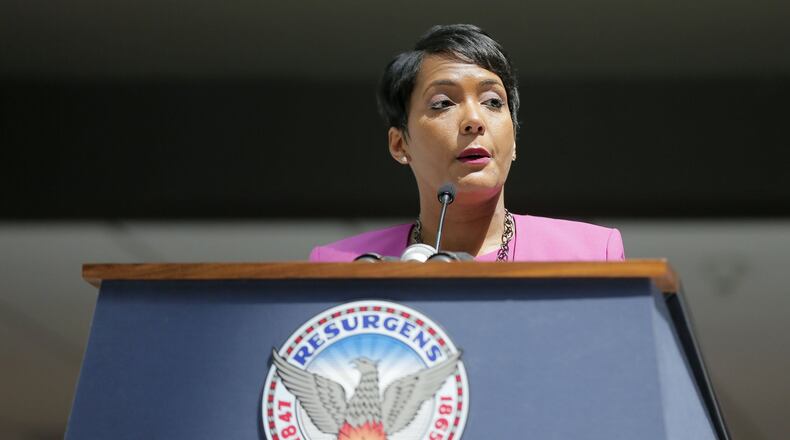The City of Atlanta has failed to spend $41 million meant to house people with AIDS and HIV as a crisis over unpaid contractors threatens to leave 250 clients homeless , according to U.S. Department of Housing and Urban Development figures.
The unspent grant funding amounts to about 40 percent of the $101 million allotted by the federal government to the city-run Housing Opportunities for Persons with AIDS program since about 2014, numbers from the Office of Grants Management show.
Atlanta has consistently failed to spend its full share, all the while making chronically late reimbursements to agencies that provide the subsidized housing. Nonprofits that contract with the city are outraged over the spending holdups.
The city owes Positive Impact Health Centers about $1 million, said CEO Larry Lehman. Although city Office of Grants Management Director Karen Carter said at a public meeting June 27 that her department had processed payments to Positive Impact, Lehman said it has yet to receive most of the promised funds. The nonprofit’s unpaid reimbursement requests continue to pile up.
“This is absolute absurdity,” Lehman said. “Agencies cannot fund the city of Atlanta when they’re sitting on $41 million.”
The $41 million in unspent money is current as of June 1, a HUD spokeswoman said Friday. According to the city’s tracking system, there is $31 million left to spend, city spokesman Michael Smith said in an email, but the city figures have yet to be reconciled with HUD’s.
Carter previously said that all of the unspent money has been allocated and a mismatch in financial calendars between the city and HUD caused delays in spending approvals.
Mayor Keisha Lance Bottoms proposed a long-term fix late Thursday that backers hope will end the funding problem.
Under the proposal, Partners for HOME, a nonprofit the city created to provide homelessness services, will take over the program for the 2020 funding cycle, its executive director, Cathryn Marchman, said. The city administers the federal program for 28 counties in and around the metro area.
But the implementation timetable remains unclear. Approval from the nonprofit’s board, the City Council and the U.S. Department of Housing and Urban Development are required.
Also unclear is how long it will take to help people currently at risk of becoming homeless.
The nonprofit is coordinating with city departments, current HOPWA providers and other agencies to ensure that clients currently at risk of homelessness continue to have housing, Marchman said.
“Every individual has a different situation with different needs, so I don’t have an exact time table because there could be some clients that will need more long-term support and some clients who only need a little bit of support,” Marchman said.
‘People will die in the streets’
A coalition of reformers have requested HOPWA reforms for more than a year. The city has considered this reorganization in recent months because of long-planned planned federal funding cuts that will force the program to focus on HOPWA clients with the most urgent housing needs, Marchman said.
Members of the mayor’s LGBTQ Advisory Board requested the reorganization earlier this month in a meeting with Bottoms’ top aides.
The tardy payments threaten the financial health of agencies that provide HOPWA services, forcing some to turn away those seeking help when their funds run low. Certain providers said city payments have consistently been hundreds of thousands of dollars behind.
Nonprofit agency Living Room furloughed employees and left its portion of subsidized rent unpaid in its ongoing feud over $500,000 in late payments. Landlords have started the eviction process for about 250 of its clients.
The city accused Living Room of providing shoddy services and mismanaging finances. It terminated the agency's contract July 3. Living Room filed suit June 10 , saying it is a victim of retaliation because its Executive Director Jerome Brooks spurned the sexual advances of Preston Brant, the former head of the city office that oversees HOPWA. Brant denied the accusation.
The city's history of late payments and poor mismanagement led providers to question a City Council proposal that the city provide. 1.5 million in emergency funding to keep clients housed. The draft legislation, submitted by Councilwoman Joyce Sheperd, would send funding originally planned for the Living Room to eight other agencies that currently contract with the city to offer HOPWA services.
A July 16 letter sent by 95 advocates for those with HIV requested that City Council return immediately from recess to legislate solutions to the crisis. Otherwise the proposal would not come up for a vote until Aug. 5, when the council returns.
“To put it clearly — without council’s immediate and expansive intervention, people will die in the streets,” the letter says.
Those who signed the letter included Nicole Roebuck,the head of AID Atlanta, which would receive funding under the proposal, Jeff Graham, the head of LGBTQ advocacy group Georgia Equality, and members of the mayor’s LGBTQ Advisory Board.
Councilman Antonio Brown and other local leaders are trying to determine whether the money can be distributed earlier.
“There’s a lot of innocent folks being impacted by way HOPWA has been and currently is being administered,” Brown said.
About the Author
Keep Reading
The Latest
Featured


